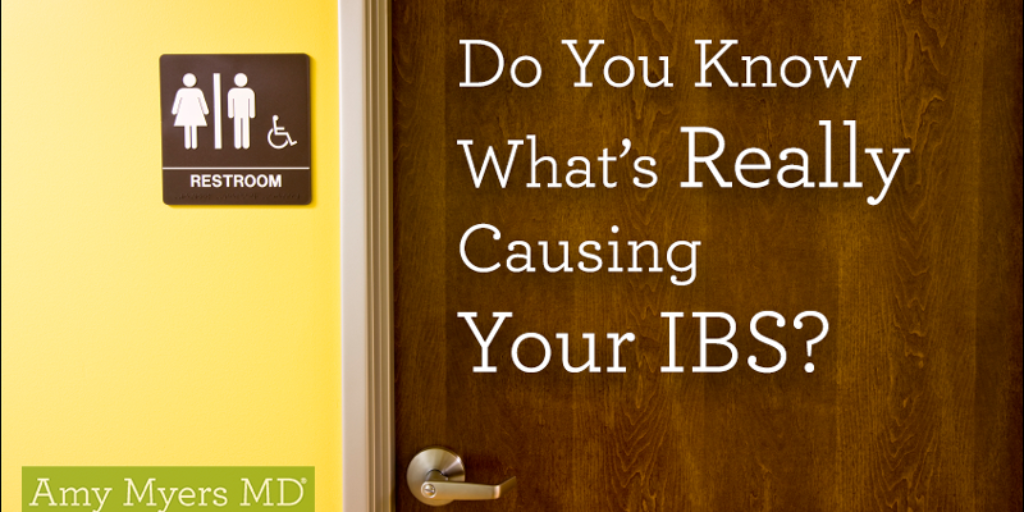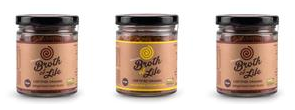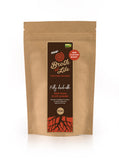
Written by Dr Amy Myers.
Do you often find yourself scrambling to find a bathroom at the worst possible moment? Do you get anxious about traveling because you worry that your constipation will act up? Or maybe you try not to stray too far from home at all, for fear that you won’t find a bathroom? If so, you are not alone. Irritable Bowel Syndrome (IBS) is the most common functional gastrointestinal (GI) disorder. In fact, studies estimate that 38-96 million Americans suffer from IBS, although only 5 to 7% have been diagnosed. Symptoms of IBS include frequent diarrhea, constipation—or both—gas, bloating, and abdominal pain.
IBS is a group of symptoms, including abdominal pain or discomfort and changes in bowel movement patterns. Doctors call IBS a “functional gastrointestinal disorder.” This means that the GI tract behaves doesn’t function properly, but does not show any physical damage.
In reality, IBS is a diagnosis of exclusion, meaning you’ve had extensive lab testing, studies, and procedures done, but everything comes back normal, and doctors are unable to identify a diagnosable condition that would explain your symptoms. Because of this, conventional medicine focuses on managing the symptoms of the disease, usually with potent immunosuppressive medications and invasive surgeries.
In Functional Medicine however, we know that IBS isn’t just uncomfortable and potentially embarrassing, it is a sign that something is awry in your gut. We also know that treating the symptoms while leaving the underlying cause untreated can lead to even more serious problems, including an autoimmune disease.
What causes IBS?
So, what exactly are the underlying causes of IBS? The answer depends on the individual. Because IBS is not a single disease with a single cause, but rather, a complex collection of symptoms, it has several possible causes. And, while it isn’t officially classified as an autoimmune disease, it shares some of the same risk factors of autoimmunity, including leaky gut, dietary factors, toxins, infections, and stress, as well as an underlying inflammatory condition.
That being said, the latest research, as well as my own clinical experience, suggests that in most cases, there are six main underlying causes of IBS. People with IBS may have any one of these factors, or a combination of them. A functional medicine doctor can help you identify the specific cause (or causes) of your individual IBS symptoms.
1. Leaky Gut
The healthy GI tract serves as a barrier that prevents undigested food particles, microbes, toxins, and other undesirable substances from entering the body through the bloodstream. When the cells lining the intestinal wall become damaged, they break apart, allowing these substances to “leak” into the body, where they are treated as “foreign invaders” by the immune system. The immune system launches an attack to rid the body of these invaders, and inflammation can result. Studies have shown a link between IBS and leaky gut. Fortunately, leaky gut syndrome can be treated with a comprehensive elimination diet and a 4R program.
2. Small Intestinal Bacterial Overgrowth
The symptoms of IBS are similar to those of Small Intestinal Bacterial Overgrowth (SIBO), which can include gas, bloating, and diarrhea. SIBO occurs when the bacteria in our gut get out of balance and overgrow. In one study, nearly 80% of people with IBS were found to have SIBO. When the SIBO was treated, nearly half of the patients experienced improvement in their IBS. If you suspect that SIBO may be the underlying cause of your IBS, you can ask your doctor to order a SIBO breath test. This test will determine if SIBO is present, and will also provide helpful information indicating what treatment protocol will be most effective. Treatment for SIBO includes a 4R program, a low-carbohydrate diet, and prescription Xifaxan or Microb-Clear.
3. Yeast Overgrowth
Yeast overgrowth, commonly referred to as Candida, produces symptoms frequently attributed to IBS, including bloating, gas, constipation, and diarrhea. Like SIBO, yeast overgrowth occurs when the natural balance of your gut flora is disrupted, but instead of bacteria, it’s yeast or fungi that multiplies unchecked. Candida can release toxic byproducts into your bloodstream and is a common cause of leaky gut. There are a variety of tests you can use to determine if you have Candida overgrowth, and you can learn more about them in this article.
Because yeast feeds on sugar, the treatment for Candida overgrowth includes a low-carbohydrate diet, anti-fungal supplements specific to yeast, and probiotics to restore your gut’s natural balance. You can treat your yeast overgrowth at home using The Myers Way® Candida Control Program, a complete 30-day program that includes a meal plan, supplement regimen, recipe book, shopping lists, and a guided email series.
4. Parasites
Intestinal parasites including Giardia lamblia, Blastocystis hominis, Dientamoeba fragilis, may be a common cause of IBS, and they often are undiagnosed. I routinely screen my IBS patients for intestinal parasites with a comprehensive stool test. But before I help them clear the infection, I assess whether or not the parasite is a) directly harmful, or b) potentially beneficial. While parasites can be the cause of IBS and ulcerative colitis, in Crohn’s disease, certain types of parasites can actually be helpful. It is important to assess your case individually with your functional medicine doctor. If a parasite is contributing to your IBS, there are prescription medications specific to certain species of parasites that can be used. Or, if the species of parasite cannot be identified, I recommend Microb-Clear, which provides a broad spectrum of activity against the most common pathogens present in the human GI tract, while sparing the beneficial gut bacteria.
5. Food allergens or sensitivities
Food allergies or food sensitivities typically present with symptoms including gas, bloating, abdominal pain, and changes in stool frequency and consistency, much like those of IBS. In food sensitivities, which cause IgG or delayed immune responses, it can take up to 72 hours for symptoms to appear, making the cause difficult to pin down. In addition to the most common food allergies, such as peanuts, I find that gluten, dairy, corn, soy, and eggs are common food sensitivities that irritate the bowel and digestive system, leading to IBS-like symptoms.
To identify foods that might be causing your IBS symptoms, as well as other symptoms that you might have thought were unrelated to your digestive distress, I recommend completing a comprehensive elimination diet. The program will remove all common inflammatory foods from your diet and then reintroduce them one at a time so that you can determine any food sensitivities.
6. Stress
Many IBS patients notice that their symptoms become worse as their stress increases, and studies have shown a link between higher stress levels and increased rates of IBS. This is because your brain and your gut are connected by your central nervous system via the vagus nerve. When you are stressed, your body’s stress response can cause your colon to contract too much or too little (causing constipation or diarrhea) in the same way that stress can cause your heart rate to increase and your blood pressure to rise.
Interestingly, the connection shared between your gut and your brain is actually a two-way connection. Your brain sends signals to your gut, but your gut produces key neurotransmitters that your brain uses to regulate mood. In fact your gut produces 95% of your serotonin, a neurotransmitter that regulates mood and sleep. This means that gut issues can impact your serotonin levels, causing you to actually experience more stress, which can in turn affect your IBS. To learn more about the gut-brain connection and how to manage your stress, you can read this article.
The Myers Way® Approach to Irritable Bowel Syndrome
Establishing the underlying cause of the irritable bowel syndrome for each patient allows me to choose the most effective treatment strategy. For most people with IBS, conventional medicine treats the symptoms of the disease—usually with potent immunosuppressive medications and invasive surgeries—while ignoring the underlying causes that led to the inflammation in the first place. Whether the cause is due to leaky gut, Small Intestinal Bacterial Overgrowth, yeast, food allergens or intolerances, stress, or some other factor the key to overcoming your IBS symptoms is to heal your gut using my 4R Program.
I have seen thousands of patients recover from IBS and other digestive problems by implementing the 4R approach. I walk you through this process in detail in my eCourse The Myers Way Guide to the Gut, and below is a quick overview of the program.
The 4R Program
- Remove. Remove the bad, getting rid of things that negatively affect the gut, including inflammatory foods such as gluten, dairy, corn, soy, eggs, and sugar, infections from parasites, yeast, or bacteria, and irritants such as alcohol, caffeine, and drugs.
- Replace. Replace the good, adding back the enzymes and acids required for proper digestion.
- Reinoculate. Restore a healthy balance of good bacteria by reintroducing beneficial bacteria through a high-quality, multi-strain probiotic supplement.
- Repair. Provide the nutrients necessary to help heal the gut. One of my favorites supplements is L-glutamine, an amino acid that helps to rejuvenate the gut wall lining. Other key nutrients include zinc, omega 3 fish oils, vitamin A, C, E as well as herbs such as slippery elm and aloe vera.
BUY PROBIOTIC
BUY DEHYDRATED BONE BROTH
BUY FULLY DISSOLVING BONE BROTH POWDER





















